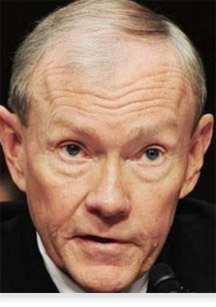WASHINGTON (Reuters) – The top US military officer said yesterday that a military strike against Iran would be premature, because it is unclear that Tehran will actually use its nuclear capabilities to build an atomic bomb.

There has been public discussion in Israel about whether it should attack Iran to stop it from developing a nuclear bomb.
The two foes have traded blame over incidents that ratcheted up tensions recently: Israeli diplomats were attacked abroad and an Iranian nuclear scientist was assassinated in Tehran.
But General Martin Dempsey, chairman of the US military’s Joint Chiefs of Staff, said he believed the Iranian government was a “rational actor.” Therefore, it was best for the United States and its allies to stick with international sanctions and diplomacy to try and convince Tehran not to weaponize its nuclear programme, Dempsey told CNN’s “Fareed Zakaria GPS.”
“I believe it is unclear (that Iran would assemble a bomb) and on that basis, I think it would be premature to exclusively decide that the time for a military option was upon us,” Dempsey said.
He said he was confident Israel knew that this was the general US attitude, but he stopped short of suggesting that the Americans had persuaded the Israelis that it was best not to attack Iran.
“I’m confident that they [Israel] understand our concerns that a strike at this time would be destabilizing and wouldn’t achieve their long-term objectives,” he said.
“I wouldn’t suggest, sitting here today, that we’ve persuaded them that our view is the correct view …” Dempsey added.
Iranian leaders have responded sharply to speculation that Israel could bomb Iran within months to stop it from assembling nuclear weapons, threatening to retaliate against any country that launches an attack against the Islamic Republic.
Israel, which is widely believed to have the only nuclear arsenal in the Middle East, says a nuclear-armed Iran would threaten its existence. Iran says its nuclear program is for peaceful purposes.
But Iran’s recent shift of uranium enrichment to a mountain bunker – possibly impervious to conventional bombing – and refusal to negotiate peaceful guarantees for the nuclear program have raised fears about Iran’s ambitions as well as concerns about Gulf oil supplies.
However, US and European officials on Friday voiced cautious optimism over the latest signals from Tehran that it might be willing to resume talks with major powers on the nuclear issue, after the Iranians sent them a letter.
The United States also has not ruled out the use of military force to stop Iran getting a bomb. Dempsey said the US military had to have options available “should the nation decide to do something in Iran”.
“I mean, fundamentally, we have to be prepared,” he said. “And that includes, for the most part, at this point, being prepared defensively.”
Dempsey discussed Iran with Israeli leaders during a visit there last month. His interview was aired on CNN as President Barack Obama’s national security adviser, Tom Donilon, was on a visit to Israel for talks on regional issues including Syria and Iran.
Lieutenant General Ronald Burgess, director of the US Defense Intelligence Agency, said on Thursday US agencies believed Israel had not yet taken a decision to launch a full-scale military strike on Iranian nuclear sites.




